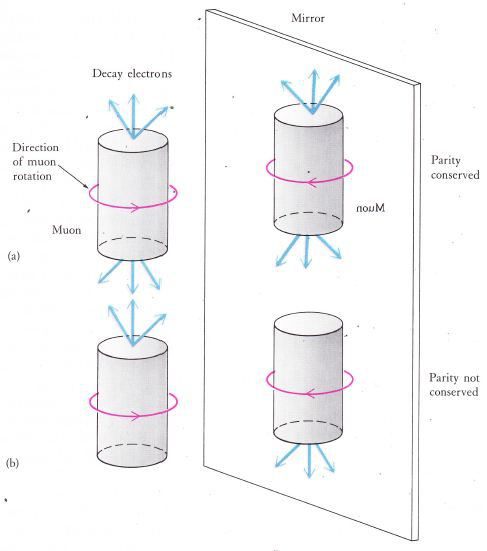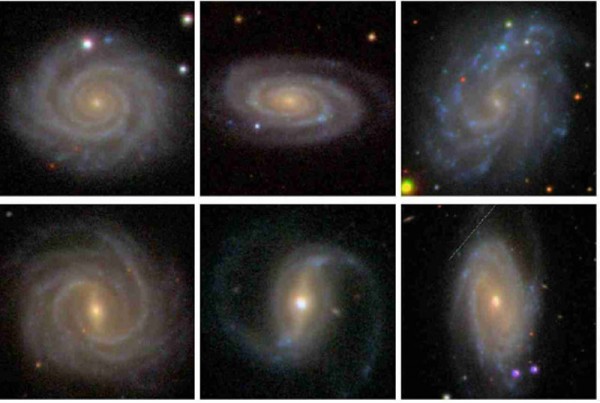“Since the beginning of physics, symmetry considerations have provided us with an extremely powerful and useful tool in our effort to understand nature. Gradually they have become the backbone of our theoretical formulation of physical laws.” -Tsung-Dao Lee
We normally think of the Universe as being symmetric, in the sense that no one direction, location or configuration is inherently preferred over another. But at some level, the laws of physics aren't completely symmetric, as we see from the decays of certain elementary particles.
 Image credit: author durbarsquare of http://readingpenrose.com/2014/05/07/on-cpt-symmetry-and-time-reversal-….
Image credit: author durbarsquare of http://readingpenrose.com/2014/05/07/on-cpt-symmetry-and-time-reversal-….
Could it be possible, then, that even the spiral galaxies in the Universe have a preferred direction? That perhaps the Universe was born with an intrinsic preference for the direction of rotation, and that would be imprinted in the galaxies today?
There's some evidence for it, but is it enough to convince you? Get the facts and decide for yourself!
- Log in to post comments


How is the dipole of the rotation axis identified? Angular momentum can only be said to have a "handedness" if the axis of rotation some kind of "up" or "down" dipole. How can we tell which way is up in the axis of a spinning galaxy?
@ Sierra
it's in reference from us. Looking from earth.
@Sinisa
Well, that isn't 'handedness. Handedness is an intrinsic property of an object. The observation you describe is an Anisopotry.
Dang. I misspelled Anisotropy.
Well, the whole article is about being directionally dependent, so yes, it is anisotropy.
Handedness doesn't exist and is not an intrinsic property of an object, if you mean "spin", that is a property of fundamental particles, not galaxies.
@Sierra Nevada #1, #3: The question Ethan poses about "handedness" is correct, and is _also_ a question about anisotropy. The latter term is imprecise -- we could have anisotropies in temperature (and we do!), or in density (and we do!), as well as in angular momentum.
Angular momentum is the point of Ethan's post. We determine (in principle) the orientation of a galaxy's angular momentum by observation: if it is face-on to us, then we can see which way the spiral arms are pointed, and that tells us whether the rotation axis is oriented toward us (right handed) or away (left handed).
If you then make a plot of that orientation for each galaxy, vs. each galaxy's position in space (or on the sky), then you can (again, in principle) extract a net overall orientation for the Universe, or a lack of such orientation.
@Sinisa #5: We can, and do, define "handedness" as an intrinsic property, a shorthand word for "direction of the angular momentum vector". For elementary particles, the direction is specified relative to the particle's momentum vector. for macroscopic objects, it's defined observationally, as I described above.
Is there any correlation between the age of the Galaxy and its spin direction?
Could the number of mergers with SMBH turn the galaxy around?
Sorry Michael, just haven't heard it often. Rotation, yes, handedness not so much. But english isn't my native language.
@Sinisa #8: Ah, no worries. In English, we refer to neutrinos, for example, as "left-handed" because their spin direction is antiparallel to their momentum (and anti-neutrinos are right-handed).
@Michael
As terms, Anisotropy may be imprecise for the observations of galaxies, but Handedness is inaccurate. I'll take imprecise over inaccurate any day.
The orientation, relative to a given observer, of a Galaxy's angular momentum vector is dependent only on the relative position of the observer to the Galaxy. There is no dipole, as there is in the case of the neutrino where the the angular momentum vector can be either oriented "up" or "down" the direction of the momentum vector.
I can see how an anisotropy for the angular moments can be interpreted as a "handedness" for the observable universe, but not for the galaxies themselves.
And I know I seem pedantic on this point, but what confused me in Ethan's writing about the putative handedness of the universe gets confusing when he the writes things like:
"Moreover, we wouldn’t expect any region of sky to contain a statistically significant preponderance of one “handedness” of galaxy over the other."
"greater abundance of left-handed galaxies in one direction… and a greater abundance of right-handed galaxies in the other"
I understand what the article was saying, but by seeming to apply the concept of handedness to individual angular moments of galaxies, Ethan runs the danger of confusing lay readers about handedness and spin, rather than educating them.
I always find Ethan to be an excellent physics communicator, which is why I got caught up short by the usage here.
@ Sierra,
seems to me the confusion comes if you (wrongly) attribute QM properties to macroscopic objects.
Handedness/spin (in QM) - is an intrinsic property ONLY for elementary particles. i.e. an electron can have spin up or down, and nothing else. And it can't be without spin. And that QM spin or handedness isn't really 100% same as rotation. And we will always agree on spin direction in QM, because it's not dependent on our position.
But macroscopic objects don't have QM spin/handedness.
Macroscopic objects can rotate, but rotation isn't an intrinsic property. They can rotate, they can stop, they can speed up or slow down. And they can change the direction of rotation. And most importantly, the direction of rotation is dependent of observer position (anisotropy).
Galaxies rotate. As any other gravitationaly bound system. The direction of their rotation can be clockwise or anticlockwise when looked from earth. Ethan might have given a better example i.e. a solar system instead of muon, but what the heck.
I agree, that mixing classical rotation, and QM spin in same article can be confusing, but only if you apply QM attributes to non-QM systems.
Once I figured out that handedness was not intrinsic, what left me confused is the suggestion that a systemic bias in human perception of "handedness" could explain the imbalance. But surely if people have a tendency to see unclear cases as right-handed, say, then they will see more right-handed galaxies in both directions. So first I'd like to know if there *is* a documented preference for imposing one handedness over the other when the object is indistinct (or is this just a guess, to explain the surprising result). And second, I'd like to know how this preference or bias would account for observers in one direction seeing a surfeit of right-handed galaxies, and observers in the other direction seeing a surfeit of left-handed galaxies.
@Sinisa
Well, I really don't know how to say this other than you are incorrect or just misunderstand the word being discussed.
Macro objects DO in fact have "handedness." Your left and right hands, for instance, are examples of objects that have an intrinsic "handedness." The direction of the angular momentum vector is assigned, by convention, using the "right hand rule" which would be nonsensical if macro geometric objects like your hands did not possess handedness as an intrinsic property.
Chirality in chemistry refers to an intrinsic property of chemical isomers whose sole difference is their handedness. Your body, for instance, processes left handed and right handed sugars differently. Your amino acids also are functionally different from their chiral counterparts because of the difference in handedness.
Handedness is a geometric property that is not confined to QM.
To put my objection to the usage of handedness in the article another way:
The confusion that exists in the discussion between Sinisa and myself is why I objected to the usage in the article of handedness for galaxies in the first place.
An axially symmentric, spinning object like a galaxy or a planet doesn't have an intrinsic "top" or "bottom" pole. The assignment of an angular momentum vector to the object using the right hand rule does create the illusion of a dipole, but that is an artifact of the use of a chiral object (the right hand) in the convention for assigning the vector's direction. Chirality for spinning objects only applies if there is separate dipole which the angular momentum vector can be aligned with (or not).
In my opinion, it would have been better if the article had simply talked about the possible observed anisotropy of the angular momentum vectors, which would have suggested a dipole of some sort in the observed universe.